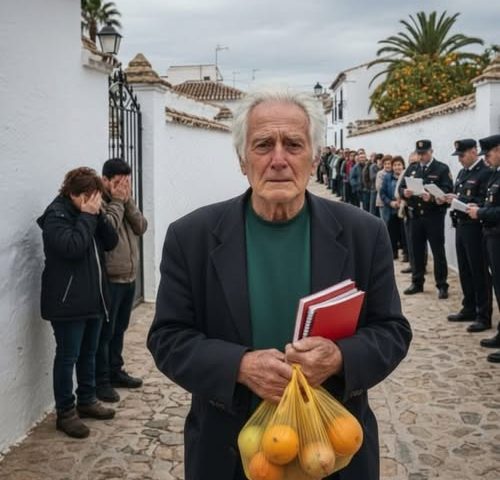“Dad, don’t worry. Once the house is finished, you’ll stay on the first floor—spacious, cool, and with a lovely altar for Grandma and Grandpa.”
Those words from my eldest son still echo in my mind. That day, holding the deed for the last piece of land I’d worked my whole life to buy, I swallowed my tears and signed it away.
I handed them the three million pesos and told myself, “It’s alright. I have children and grandchildren. As long as I have a place to live in my old age, that’s enough.”
When the house was done—a three-story beauty that looked like a palace—everyone in the neighborhood admired it.
“How lucky you are, Don Andrés. Such a devoted son,” they said.
But the happiness was short-lived.
Two months later, on a hot afternoon, my son and his wife called me. Their faces were cold, distant.
“Dad,” he said flatly, “we’ve decided to live separately. For now, please stay in a boarding house so it’s easier for us to manage the home.”
The words shattered me.
After a lifetime of hard work, I was being cast out of the house built with my own sweat.
That night, I couldn’t sleep.
In my small rented room, with the fan squeaking above me, I replayed his smile when I handed him the money, and the promises he’d made.
They thought I was just a naïve old man but I had prepared for this.
Since my wife’s d3ath, I’d learned to face loneliness, but I also knew my eldest son well – ambitious, manipulative, always looking down on his siblings. So before agreeing to sell the land, I had gone to see a lawyer.
He advised me:
“Let the title go under your son’s name, Don, but sign a special power of attorney to retain control. If they mistreat you, you’ll have legal ground.”
I followed his guidance carefully. I locked the documents in an iron box, kept the recordings of my son’s promises – proofs I might one day need.
When they drove me out, I stayed silent. My daughter-in-law smiled triumphantly, thinking she was rid of a burden. But inside, a quiet fire began to burn.
I worked odd jobs at the construction site nearby, earning just enough to get by—and to keep an eye on them.
They were drowning in debt.

A week later, I revisited the lawyer with the documents and recordings. He nodded, satisfied.
“You have a strong case, Don. You still own half the property. We can take this to court.”
But I wasn’t in a hurry. I wanted them to feel the weight of their choices. I confided in my youngest son, who lived far away. He wept when he heard.
“Don’t cry,” I told him. “Let your father teach your brother a lesson.”
Step by step, I gathered the evidence such as their debts, the loan records, and finally a formal legal notice asserting my rights to half the house.
The news hit them like a storm. My daughter-in-law burst out,
“Dad, are you really suing us?!”
I simply replied,
“You started this. I just want what’s fair.”
They were speechless. The “helpless old man” didn’t seem so helpless anymore.
Months later, the first court hearing began. My son, pale and trembling, claimed the house had been a gift. But when my lawyer presented the notarized papers and recordings, the courtroom went silent.
The judge ruled, “Half of the property remains under the father’s legal right.” He suggested we reach an agreement.
I turned to my son. “I don’t want everything,” I said calmly. “Just half—to build your mother’s altar and have a place to rest. The rest is yours.”
Tears welled in his eyes. His wife said nothing. For the first time, they understood that a father’s kindness is not weakness.
I moved back to the first floor—simple, peaceful. I set up the shrine for my late wife and told my son,
“Don’t forget your roots. Money can be lost and earned again. But when kindness is gone, it never returns.”
Since then, the house has been quiet—but filled with respect.
Sometimes my daughter-in-law brings me food. I accept it without anger.
I didn’t fight to take revenge, only to restore dignity.

Word spread through the neighborhood. Some said I was harsh, others called it justice. I just smiled. For me, the real victory wasn’t the house, but the dignity of a father who refused to be erased.
One evening, my son entered with a cup of tea. “Dad… forgive me.” He was no longer proud—just broken.
“Son,” I said, “I’m not angry you kicked me out. I’m sad you forgot your parents’ love.”
At the mention of his mother, tears ran down his face.
“I thought wealth would make me happy,” he whispered. “But it means nothing without you.”
I sighed. “A house can be grand, but if it’s empty of love, it’s just walls. I lived in poverty with peace in my heart—how could you forget that?”
He knelt before me. “Please, Dad… give me another chance.” I rested a hand on his shoulder. “I don’t need promises. Just remember—money can be regained, but the love between parents and children, once lost, may never return.”
The cool night breeze carried the scent of jasmine through the window. He looked at me, eyes full of remorse. We drank in silence.
I don’t know if he’ll truly change, but I know he’ll never forget the lesson that even an old man still holds wisdom, strength, and the power to teach what love and respect really mean.
